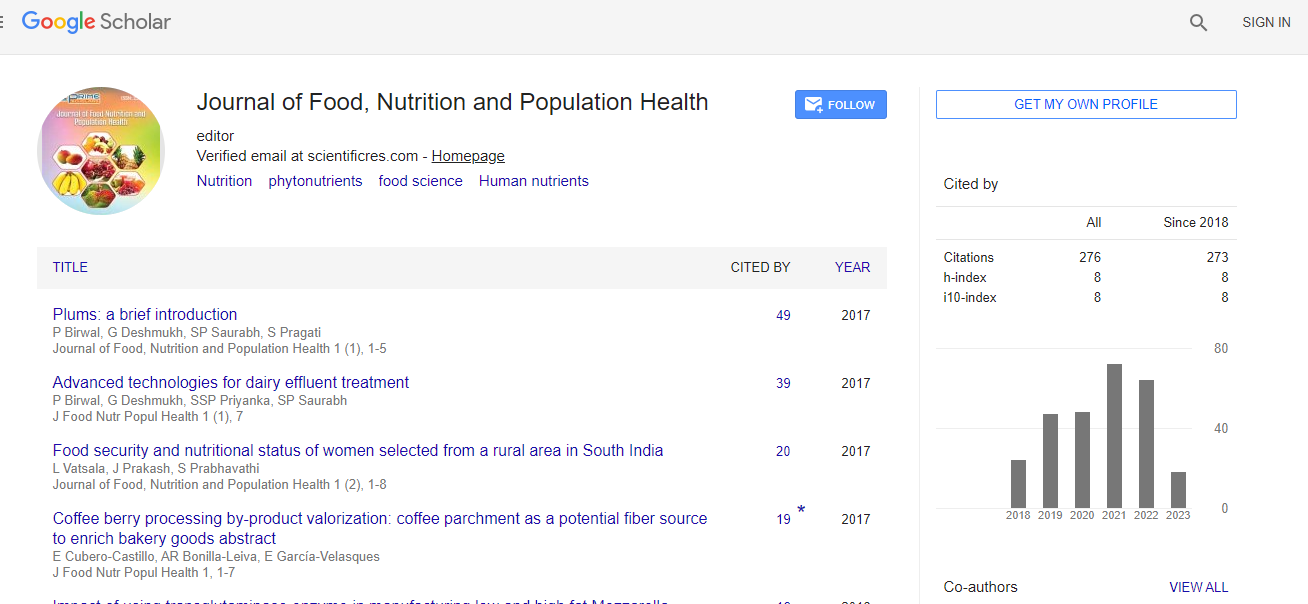Commentary - (2024) Volume 8, Issue 3
Overeating: Understanding Causes, Consequences, and Strategies for Control
Ava Jones*
Department of Food and Nutrition, Duke University, USA
*Correspondence:
Ava Jones,
Department of Food and Nutrition, Duke University,
USA,
Email:
Received: 02-Sep-2024, Manuscript No. IPJFNPH-24-21231;
Editor assigned: 04-Sep-2024, Pre QC No. IPJFNPH-24-21231 (PQ);
Reviewed: 18-Sep-2024, QC No. IPJFNPH-24-21231;
Revised: 23-Sep-2024, Manuscript No. IPJFNPH-24-21231 (R);
Published:
30-Sep-2024, DOI: 10.21767/2577-0586.8.3.27
Description
Overeating, a prevalent issue in modern societies, goes beyond
the occasional indulgence at a festive meal. It’s a behavior that
can have significant implications for physical and mental health,
leading to weight gain, metabolic disturbances, and emotional
distress. This article delves into the causes of overeating, its
impact on health, and practical strategies for managing and
preventing it. Overeating refers to consuming more food than
the body needs, often beyond the point of satiety. This can
involve eating large portions, frequent snacking, or consuming
excessive calories. Eating without paying attention to hunger
cues or portion sizes, often driven by distractions like television
or stress. Using food as a coping mechanism for emotional
stress, boredom, or depression rather than physical hunger.
An uncontrollable urge to eat, sometimes linked to eating
disorders such as binge eating disorder (BED). Emotional eating
is a common response to stress, anxiety, or depression. Food
can provide temporary relief or comfort. Long-standing eating
habits and routines, such as eating in response to boredom or
social triggers, contribute to overeating. Large portion sizes,
whether at home or in restaurants, can encourage overeating
by making it difficult to gauge appropriate serving sizes. Easy
access to high-calorie, low-nutrient foods, such as snacks
and sugary beverages, increases the likelihood of overeating.
Dysregulation of hunger and satiety hormones, such as ghrelin
and leptin, can lead to overeating. Variations in metabolic
rate and the body’s response to different types of foods can
influence eating behavior. Consistently consuming more
calories than the body needs leads to weight gain and can
contribute to obesity. Overeating can disrupt normal metabolic
processes, leading to conditions such as insulin resistance,
type 2 diabetes, and hypertension. Excessive eating can cause
gastrointestinal discomfort, bloating, and long-term digestive
issues. Overeating, especially in the context of emotional
eating, can lead to feelings of guilt, shame, and low self-esteem.
The cycle of overeating and its consequences can exacerbate
stress and anxiety, creating a vicious cycle. Focus on your
eating experience—chew slowly, savor flavors, and recognize
hunger and fullness cues. Use smaller plates and bowls to help
manage portion sizes and avoid overeating. Aim for meals that
include a variety of nutrients—proteins, healthy fats, fiber-rich
carbohydrates—to promote satiety and reduce the likelihood
of overeating. Maintain a consistent eating schedule to prevent
excessive hunger and the impulse to overeat. Engage in stressreducing
activities such as exercise, meditation, or hobbies
to reduce reliance on food for emotional comfort. Consider
professional support from a therapist or counselor if emotional
eating is a significant concern. Keep nutritious snacks on hand
and minimize the availability of high-calorie, low-nutrient
foods. Plan and prepare meals in advance to avoid impulse
eating and ensure you have healthy options readily available.
Establish clear, achievable goals related to eating habits and
monitor progress. Track food intake to identify patterns and
triggers related to overeating. Overeating is a multifaceted
issue influenced by psychological, environmental, and
biological factors. Addressing it requires a holistic approach
that includes mindful eating practices, balanced nutrition,
emotional support, and behavioral strategies. By understanding
the underlying causes and implementing practical solutions,
individuals can take proactive steps towards healthier eating
habits and overall well-being. Managing overeating not only
improves physical health but also supports emotional balance
and a more positive relationship with food.
Acknowledgement
None.
Conflict Of Interest
None.
Citation: Jones A (2024) Overeating: Understanding Causes, Consequences, and Strategies for Control. J Food Nutr Popul Health. 8:27.
Copyright: © 2024 Jones A. This is an open-access article distributed under the terms of the Creative Commons Attribution License, which permits unrestricted use, distribution, and reproduction in any medium, provided the original author and source are credited.

